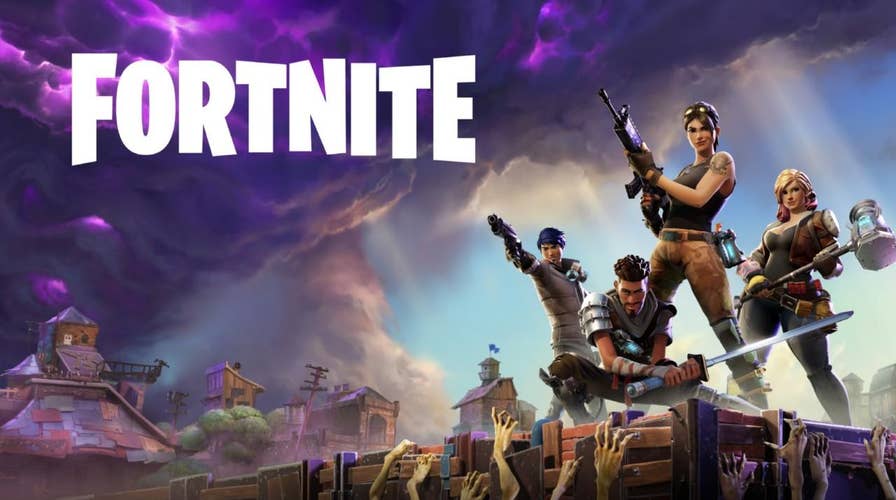Wildly popular ‘Fortnite’ video game breaks YouTube record
'Fortnite' is fast becoming a cultural phenomenon and has set a new YouTube record for a live gaming stream. The multiplayer shooter game, which lets players navigate a vast landscape, has racked up a huge following.
The survival video game “Fortnite” exploded in popularity this year, boasting 125 million players and taking over as the most popular video game to date.
Since it arrived on the scene it’s made addicts out of kids and adults alike. Instead of parents setting boundaries for screen time and then enforcing some outdoor time, they’ve enabled the behavior by hiring coaches to improve their kids’ scores. That’s right, they’re paying someone actual money to encourage their children to sit on a couch and stare at a screen while helping them improve a fictional score.
Ally Hicks, from Winchester, England, who hired a coach for her son said, “There’s pressure not to just play it but to be really good at it. You can imagine what that was like for him at school.”
The pressure to keep our kids from failing has crossed into crazy town. We are raising up a generation of overly programmed kids who are a product of participation trophies and don’t know how to fail and won’t know how to function when they’re no longer being sheltered in their fail-proof world.
Simply put: we’re not giving them permission to fail at anything - except failing.
In my generation of admittedly low-tech video games like “Pac-Man,” which consisted of power pellets, Pac dots and ghosts, when we ran out of lives we ran outside because it was OK to not be the best at everything. We understood that sometimes you eat the ghost and sometimes the ghost eats you. “Fail” was an acceptable four letter word.
It would never occur to our parents to hire someone so we can improve our “Pac-Man” score. Piano lessons – yes; gymnastics – sure; soccer camp – absolutely. Paying someone to teach us how to out maneuver a fictitious character behind a screen? Not a chance.
In some cases the kids don’t even want the coaches, it’s the parents who are pushing them. Dale Federighi from San Jose, Calif. said his kids are “very stubborn.” They wanted no part of a coach when he hired one for himself.
His son, Elliot said he felt as if taking lessons was “over the edge.” Apparently now they’re having a change of heart.
Some parents attempt to justify hiring a “Fortnite” instructor by equating a video game coach with a sports coach, saying it’s on the same level as hiring someone to help their child hit a curveball. Not exactly.
Euan Robertson from Switzerland, who recently hired a coach for his sons said, “There isn’t any inherent risk. They’re not going to break a leg playing video games.”
They probably won’t break any legs, but adverse physical consequences from video games are in fact real. That’s not my opinion, but the opinion of a child, adolescent and adult psychiatrist.
This is not to say all video games are bad. They have their place. Everything in moderation. However, when it becomes an addiction and it’s at the expense of actual physical activity and social interaction, it ceases to be a healthy way to blow off steam.
According to The New Yorker, “In terms of fervor, compulsive behavior and parental noncomprehension, the Fortnite craze has elements of Beatlemania, the opioid crisis and the ingestion of Tide Pods.” Not exactly a ringing endorsement.
As if the game wasn’t already addictive enough Epic Games Inc., the creator of “Fortnite,” has enticed players with $100 million in tournament prizes. Now some parents have their hopes set on their kids winning money or becoming a professional gamer.
Adrian Luff from San Marcos, Texas hired coaches for all three of his boys and is hopeful that at least one of them will become a professional. He said, “They can fund my retirement.”
Could it just be possible that Luff, who also plays the game but admittedly said he isn’t as good as his sons, is trying to live out his dream vicariously through his sons?
Not to crush anyone’s hopes and dreams, because this is America after all – the land of possibilities. However, there are only roughly 500 highly paid professional gamer jobs that exist throughout the world, and of those only about five are open to people from the U.S. That said, you should probably have a Plan B just in case.
The odds are probably in the same ballpark as me winning the lottery, getting struck by lightning or having Joanna Gaines come redesign my house. All possible scenarios, some much more appealing, but none very likely.
In today’s high-strung, overcharged world we need to teach our kids that it’s OK to fail. As parents we need to step back, take a breath and remind ourselves that if our kids fail it does not equal a parenting failure on our part.
Failure happens. Failure teaches us to persist, persevere and overcome. Failure helps us to better plan and prepare for achievement and accomplishment.
Kids need the freedom to fail so they can learn how to succeed. As parents that’s one of the best life lessons we can teach them. If we resist the urge to choreograph their every effort and accomplishment and send them out of our homes and into the world with the basic life skills to function in the face of failure we’ll have set them up for success.











































